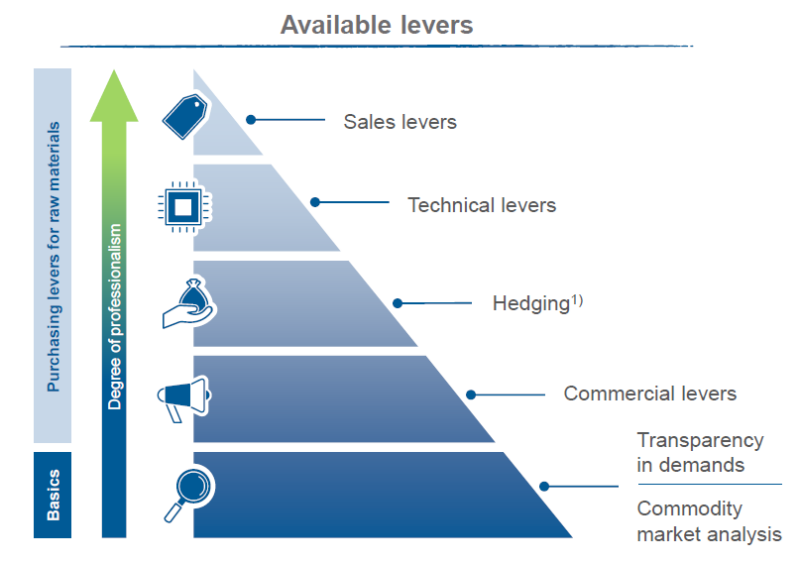- Kostenoptimierung bei der Rohstoffbeschaffung
- Minimierung der Rohstoffrisiken (Versorgungs- und Preisrisiken) durch Optimierung bestehender sowie Verhandlung neuer Lieferantenverträge
- Etablierung von Tools und Wissen zur Sicherstellung eines langfristigen stabilen Rohstoffmanagements und einer schnellen Reaktionsfähigkeit bei Marktveränderungen
Überholen Sie mit eigenen Standards den Wettbewerb
Die vergangenen Monate haben gezeigt: Politische Krisen, Handelsrestriktionen, Währungsschwankungen und viele weitere externe Einflüsse erschweren den effizienten Rohstoffeinkauf. Externe Faktoren wie massiv gestiegene Börsenindizes und die beschleunigte Inflation beeinflussen den Erfolg in der Rohstoffbeschaffung viel stärker, als dies bei anderen Warengruppen der Fall ist.
Strukturiertes Risikomanagement sollte daher integraler Bestandteil jeder Rohstoffstrategie sein.
Gerade in der aktuellen Situation, die von Versorgungsengpässen und volatilen Preisen geprägt ist, schaffen Sie durch den Aufbau eines professionellen Rohstoff- und Risikomanagements eine höhere Planungssicherheit und Wettbewerbsvorteile.
Mit Hilfe unserer langjährigen Beratungserfahrung im Rohstoffeinkauf haben wir die vier wichtigsten Hebel identifiziert, mit denen unsere Kunden auch unter den aktuell erschwerten Bedingungen gut aufgestellt sind. Wir unterteilen das Rohstoffmanagement in Teildisziplinen, um einen vollumfänglichen und nachhaltigen Rohstoffeinkauf aufzubauen.
PROCUREMENT: LET’S GET REAL!
Unser Experte Justus zum Thema Rohstoffmanagement
In the coming months, despite the dislocations in international supply chains, buyers need to secure supply of all critical raw materials, while keeping costs under control. Given the rapid price increases in many raw materials and logistics. It is not possible to entirely avoid higher costs.However, buyers should take the time to check suppliers price requests.
This can be done, for example, with cost breakdowns in which the individual parts and the raw material content of a product are evaluated.
Most companies don’t buy the raw material itself, but products containing raw materials. On this basis, potentials for negotiations with the supplier can then arise. Buyers should realize that price increases are not just effecting their company but the market as a whole. In this situation, it can already be an advantage to analyze prices in detail and accept lower mark ups than other competitors. If you know the exact price composition, this also helps to pass on costs to customers. And later, when the raw material price level reduces, the product price composition is useful to negotiate the higher costs down again.
What we often experience are unspecific purchasing forecasts. Instead, to agree on binding uantities, only rough forecasts are communicated to suppliers and the required quantity is purchased short notice. However, when availability is limited and prices are rising, this strategy doesn’t work because the suppliers naturally first supply the customers with fixed contracts. To be fair, it is important to mention that thelimited market situation occurred very quickly.
As a result, some purchasing departments simply missed the right moment to implement the correct purchasing strategy. Additionally, not all companies operate strategic risk management systems and very few use digital solutions. This is a pity, because of course digital support and risk management takes time and investment to set up but in the long run, early warning mechanisms pay off, simply because they give time for a well-structured reaction strategy in the event of a crisis. To further expand commodity management in the current, geopolitically uncertain times companies should increasingly conduct supplier audits to guarantee continuous supply security.
Moreover, close internal cooperation is key, especially when passing on raw material costs to customers. Procurement and sales should work in close cooperation so that purchasing price changes are incorporated in sales prices.
The relevance of this purchasing level is also present in our current raw materials study that we conducted with around 100 different companies. 60% of all participating companies stated that passing on rising raw material costs is essential to keep raw material management under control.
Raw material prices became much more volatile, and suppliers don’t want to take any price risks, which is why suppliers only accept fixed prices for very short periods. This is also reflected in our current raw materials study.
In 2020, only about 10% of all participating companies were affected by strongly short and fixed price periods, whereas this year around 60% of all participants are effected. Companies should address the cost issue with their suppliers and a cooperative manner.
After all, the price increases are real. Only the price requests that suppliers derive from them are not always real. It makes sense to agree on a price escalation clause that is based on stock market indices. A price escalation clause is a win-win situation for purchasing companies and suppliers, as changes in raw material prices are more transparent and it reduces the effort of regular renegotiations. On the other hand, purchasing companies should not accept that suppliers pass on all costs 1 to 1, if the purchasing company doesn’t have that option itself with their customers.
Therefore, procurement teams should agree on a fair pain sharing with their suppliers, where everyone bears a share of the additional costs.
Wie gehen wir bei der Beratung im Rohstoffeinkauf vor?


Derzeit produziert die EU nur drei Prozent der Rohstoffe, die sie verbraucht.
Theresa Schwämmlein, Senior Project Manager, INVERTO München

Vorteile unseres Rohstoff-Workshops
Ihr Rohstoffeinkauf ist bereits gut aufgestellt, Sie denken aber dennoch, dass noch Potenziale zur Verbesserung bestehen? Dann nutzen Sie die Vorteile unseres Rohstoffworkshops. Zur gezielten Identifikation von Potenzialen und Optimierungsmöglichkeiten in Ihrem Rohstoffeinkauf bieten wir außerdem einen Rohstoffworkshop an. Hier erfahren Sie mehr.
Unsere Insights aus dem Rohstoffeinkauf
Unser Experte im Rohstoffeinkauf





